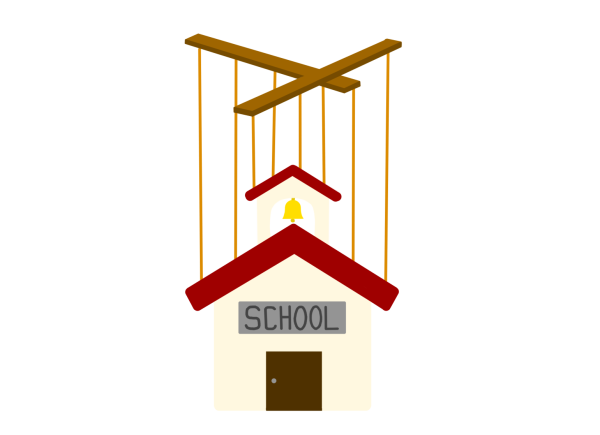Friday, March 29: An unusually somber day
Suicide is hard to talk about. It’s hard to acknowledge how much it hurts so many people.
We have not really seen such candid communication until Friday when teachers opened up a conversation and students were comfortable enough to feel vulnerable together. We learned things about our friends that we never knew. We’re so often afraid to share serious, tragic things about our histories.
But we also don’t want to make it about ourselves in moments like this. So we continue to keep our own struggles to ourselves. Especially at a place like Creek where there are so many of us and each of us only knows a fraction of the student body.
We were so happy to see people hugging each other in the hallway. Especially boys, who often don’t feel comfortable showing affection, were hugging each other without hesitation. However, it’s terrifying that our unity is rooted in mourning multiple deaths.
Mental illness feels like a secretive, intangible thing. Someone could seem happy, be here one day, then be gone the next day. It makes you wonder. Do we really know these people around us and what they’re going through? How many other kids at our school are feeling like this? It’s devastating to think about how painful it must be to feel that alone.
But where do we even go from here? Do we just go back to normal? Do we try to heal? Do we continue being sad? Is it possible to prevent suicide? How do we change the way an entire society thinks about suicide and mental illness?
It seems like there are things we can do to reduce the numbers, but we’re not entirely sure what those are.
Not knowing how to help is tough. Continually losing our friends to an abstract killer is the most powerful feeling of powerlessness.
This is becoming normal for us. We’re tired of suicide becoming ordinary, becoming what seems to be a valid option. It’s too easy and too accessible. And that’s incredibly scary.
The worst thing is to be forgotten. We fear that people will go back to normal and not remember those whose lives are ended. We don’t want to sanctify tragedy and keep the pain and anguish going, but at the same time, we don’t want to forget about them.
Sometimes, we become so numb and desensitized to tragedy that we won’t ever make changes to the way we do things. When is the right time for us to start thinking about how to fix this? People are drained and exhausted today, but we may be back to normal on Monday. In Buddhist culture, people try to heal themselves by completely forgiving and letting go. In this situation, we’re not sure what is best.
We’re worried that this is turning into a cycle that feels unstoppable.
We believe we are at a point where we can make a difference by channeling our heightened emotions of anger and grief into something positive.
The administration has already done so much. Sources of Strength is all about this. We disagree with those who say the school has nothing until now. We understand that some families wanted to grieve in private. Faculty and staff helped so many kids yesterday and we’re beyond thankful considering how many things they have to take into consideration.
We appreciated teachers saying directly that they know what’s happening and that they’re there for us.
Science teacher Jeff Boyce gave one of us a necklace made by a woman in Uganda who he said “didn’t have anything,” but she still made this. He wanted us to know that even when we feel like we have nothing, we can create something.
We hear about “starting the conversation” all the time, but it was different to hear all of our teachers interact with us so explicitly. It helped.
Considering all of this, the pain, the unity, the leadership, it’s time for deep reflection and tangible action.
There’s a Brazilian song that goes: “You must love people like there’s no tomorrow. Because there might not be a tomorrow.”
We shouldn’t wait for something like this before we show affection. We need to love each other like there’s no tomorrow.











Kathy McKittrick | Apr 1, 2019 at 8:59 AM
I’m a retired Creek teacher. My heart goes out to all of you who are dealing with this directly. Any of my former students who want to reach out to me can find me on Facebook or Creekmail. Love and hugs to you all.
Vicki Owens | Apr 1, 2019 at 6:56 AM
This tragedy is awful beyond measure and needs to stop! Please! Before we lose kore kids to their own minds and hands! However I have to say……..I am very disturbed witn the fact that the death of this poor young lady seems to be more important than the death of the poor young man earlier this semester. When he killed himself the school didn’t stop operating in a normal way, his name wasn’t front and center in our lives. He was all but forgotten immediately after his death. How awful for his parents and family. However when this young lady killed herself it changed everything. Everyone noticed and the school stopped. There in that lies the problem with teens these days. One of these young people has brought change with her death while the other didn’t. Maybe if we cared equally and completely for ALL our youth none of our youth would feel forgotten or unwanted! All kids are important and their deaths are immeasurably sad. If we had cared as much when he died maybe she wouldn’t have had to!
Your article was well written and important but we need to do more in the future. And keep going with the care and love of all our students! Thanks for your time.
Valerie | Mar 31, 2019 at 11:08 PM
My name is Valerie, CCHS alumni.
I am a suicide survivor.
I know one thing to be true, you are stronger together!!
I was 19 when I attempted suicide. Young like so many of you are. I had no idea what my future held and hardly ever did I think past the next day, the next party, the next social gathering or the next class. When I attempted suicide, I was not thinking about next week, next year or finding my soulmate, getting married, finding jobs, becoming a mother. When we are teenagers we are not thinking long term. We have yet to encounter very many situations that force us to think further out than a few days. So the idea of something, anything being permanent is still a bit foreign.
Another thing I know to be true, when I was so low that I felt like taking my life was the only option it was a moment and choice I felt like I had to do “right now”. I would be lying if I said since that day I have never considered it again. Mental illness is a struggle. It is sometimes a daily or weekly struggle. What I try to remember now is “right now” I need to shower. Or I need to grocery shop. Or in an hour I need to pick up my child. Sometimes focusing on what I have to do “right now” makes that deep, desperate feeling subside.
The reality is many people who struggle with mental illness and suicidal thoughts have them often. Even when we know that friends and family have said “i’m here, call me”, we think surely they don’t want to be called every day this week! We know there are hotlines but sometimes we struggle with telling our story again and again and again. So we don’t.
Might I suggest a space in your building with sticky notes available. A space where peers, staff, admin have access. Use these sticky notes to shared notes of support for each other. Not directed at one specific person, but to anyone stopping by to read them. Also use this space to express other feelings. Such as “today sucks”, “I am having a hard time at home”, “I broke up with my girlfriend and I feel sad”. Sometimes having a space to write down a feeling and not have to tell the story over again helps allow for some release. Stick a box next to this space for more pressing notes. Ones that might say “I need help. Signed “Joe Smith”. Have an admin or staff member check that box several times a day. Sometimes we can’t verbally ask for help, but if we can leave a note and then be called in, somehow we are more receptive to that.
Coping… when do we learn coping skills? When our fish die that have had for 2 weeks from Petsmart?
When we failed at something and now we have to do it again or find something new?
When we learn someone does not feel as strongly about us as we felt about them?
When we lose a family member like a grandparent or parent?
When we lose a friend or a peer?
We often learn as we go. It is a part of growing up and getting wiser. We need to find a way to teach kids at a young age how to cope. How to make it through tough stuff knowing that thinking beyond that moment means they get to experience life, become who they dream about being and that this moment “right now” does not have to be the end. It is just one moment and there are so many more beyond it that are absolutely worth sticking around for.
If any of you ever need support, Dr. Keogh knows how to find me. I wish you all peace, love, togetherness and the ability to watch out for each other. From the kid in IA to the Homecomming Queen, you never know what someone is dealing with. Be kind to everyone you encounter!
Much love Bruins!! The world needs you, it is worth sticking around for!
– VM
Kimberly Lottes | Mar 31, 2019 at 11:06 PM
Excellent article. I hope that our eyes and ears can be opened more to each other, perhaps with a more open heart and mind. Be more understanding to each other for our differences, kinder with our words, realize how you may impact someone’s life by a simple gesture or smile.
Jason Eckert | Mar 31, 2019 at 6:09 PM
There is more that you, as students, can do. If you would like to visit with Students from Lakewood, Golden and Ralston Valley send me an email and I will connect you, student to student.